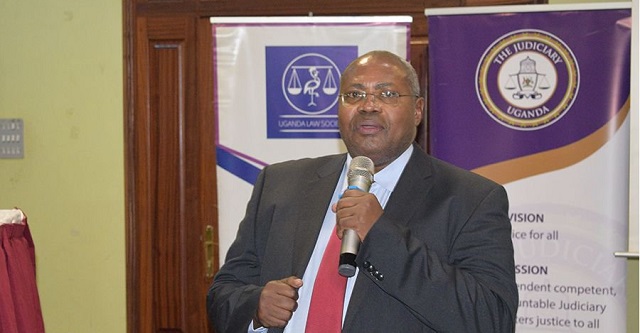
Kampala, Uganda | THE INDEPENDENT | The Constitutional Court justices have unanimously dismissed a petition filed by the former Principal Judge, Dr. Yorokamu Bamwine seeking to have equal retirement benefits like those of the Chief justice and his deputy, as provided for under the Judiciary Administration Act.
The petition was dismissed by a panel of five Justices; Catherine Bamugemereire, Stephen Musota, Christopher Izama Madrama, Muzamiru Mutangula Kibeedi, and Irene Mulyagonja, who have also dismissed the request to have Bamwine awarded costs of the petition.
Bamwine’s petition was premised on the Judiciary Administration Act which came into force on June 19th, 2020 after President Yoweri Kaguta Museveni assented to it. The Act is meant to strengthen the Judiciary as an independent arm of government. The Act provides for the continued payment of 100 percent monthly salary to a retired Chief Justice and his deputy, on top of receiving a lump sum package equivalent to 2.4 percent of his or her annual salary multiplied by five and the total number of years spent in service.
According to provisions in the same law, retired Justices of the Supreme Court, the Court of Appeal, the Principal Judge, and Judges of the High Court, will continue getting 80 percent of their salaries once they have clocked their respective mandatory ages of retirement. They will also get a lump-sum retirement benefit equivalent to 2.4 percent of their annual salary multiplied by five and their years of service. They will also be entitled to state security, chauffeur-driven cars, and annual medical and housing allowances.
But in his petition, Bamwine argued that under the Act, the retired Principal Judge is treated as a Judge of the High Court yet he has a different status, rank and dignity, and that the Chief Justice and Deputy Chief Justice continue getting 100 percent of their monthly emoluments for life unlike the Principal Judge. He argued that this was discriminatory in nature, unconstitutional because the framers of the Act were disregarding the hierarchy of the Judiciary.
He asked the Constitutional Court to declare the provisions that exclude the Principal Judge from getting 100 percent emoluments as unconstitutional, and also further asked to declare that as the administrative head of the judiciary under the constitution, the retired Principal Judge’s retirement benefits should be aligned with the benefits of the Chief Justice and the Deputy Chief Justice.
In response to the petition, the Attorney General asked court to dismiss it while relying on the affidavit of the Clerk to Parliament, Adolf Mwesige and the Human Resource Manager of Judiciary Apophia Tumwine.
These argued that Bamwine retired on December 25th 2019, before the commencement of the Judiciary Act 2020 and he was paid all his retirement benefits.
The evidence before court shows that Bamwine was paid gratuity of 1.247 billion shillings, monthly pension of 13.8 million shillings, housing allowance of 300 million shillings, security amounting to 2.4 million shillings and a chauffeur driven new car.
They noted that after such, he is entitled to earn as a sitting principal Judge and therefore the variations do not in any way disadvantage him as per the Pensions Act.
In their Judgement, the Justices ruled that the questions raised by Bamwine lack merit because they were raised outside the powers of the Constitutional Court because he raised a matter of policy rather than a question of inconsistency of the law.
“There are several laws which provide for different levels of remuneration or benefit. To hold otherwise would open up all kinds of litigation based on what somebody thinks is his or her entitlement with regard to his or her responsibilities. Such matters should be left to Parliament which is empowered on behalf of the people to make laws to ensure that whatever is paid is commensurate with the rank and status of public officer in terms of article 254(1) of the constitution,” said the Justices.
According to the Justices, the question before them was whether the payments upon retirement of the Principal Judge is commensurate to his or her rank in light of the responsibilities or being the head of the High Court and assisting the Chief Justice in the administration of High Court and supervision of the subordinate courts.
“It is my judgement that the petition has no merit as far as the question of differential discriminatory treatment is concerned,” said Madrama who wrote the lead judgement.
Madrama added that if Parliament finds merit in Bamwine’s matter, it should then look into it and ensure that the office of the Principal Judge receives a commensurate payment in terms of retirement benefits that befits a Principal Judge.
“I do not need to consider whether the Administration of the Judiciary Act also applies for the petitioner having retired just before the law came into force. That is not a question for interpretation and I decline to handle it. In any case, the respondent/Attorney General admitted that the petitioner was paid lump sum benefits under the administration of the Judiciary Act and I do not see any reason to make any comments about the issue,” added Madrama.
The same court has declined to award him costs saying it was a public interest case and that his grievances should attract Parliament attention with advice from the Judicial Service Commission.
*****
URN
 The Independent Uganda: You get the Truth we Pay the Price
The Independent Uganda: You get the Truth we Pay the Price


